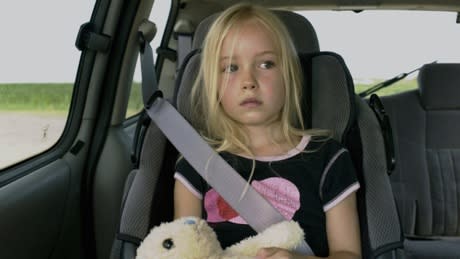Nathalie Saint-Pierre's drama about the failings of the foster care system is heartfelt and shot with a great deal of consideration but its clever structure is a doubled-edged sword.
Cyclical and episodic in nature, Catamini doesn't allow the viewer much time to get to know each character before shifting the perspective to a new protagonist. It's an alienating approach that hinders emotional investment, much like the mechanisms of the system it's depicting, where children are shuffled from home to home when they become burdensome or reach an age or temperament that no longer appeals to the specific interests of their caretakers.
After a lengthy opening shot of a wailing infant, we meet Cathy, a shy six year-old girl, being delivered to a new foster family. Showing a degree of stylistic specificity that isn't matched anywhere else in the film, the camera initially holds the viewpoint of the frightened and uncomfortable child; we don't see the faces of any adults unless they bend to her level and they carry on conversations off screen while Cathy takes in her surroundings.
It's an effective means of bringing us into her world; one full of strangers and words that have little meaning when what she really needs is something familiar and comforting. But just as we're getting a grasp on the scenario the little blonde girl is adapting to, which, to the writer/director's credit, never becomes unnecessarily creepy, the perspective shifts to that of Keyla, one of the older girls being fostered with Cathy, who is carted off to a group home for older girls when her budding sexuality starts to manifest in typical teenage exploration.
Her story, while sad in its own right, is less compelling and feels like more of a bridge to reach the next character, her new roommate—the goth-y, cynical druggie, Megan—than a fully developed chapter of its own.
When the focus turns to Megan, who is shipped off to a strict detention centre after running away, Saint-Pierre's intentions crystalize a bit more, making the contentious young woman a mouthpiece to question the controlling interests of authority.
After Megan, the connection to the final link in the chain of custody is less direct than previous transitions. Manu has just come of age, leaving a rehab centre to rejoin society as an adult. Her sheltered and submissive upbringing has left her vulnerable to predatory advances and far too willing to construct idealistic memories of her time in foster care.
Once all of the characters have been introduced they are brought together in the final act, where ugly truths and fictions bump heads to give a rounded perspective on a broken system that yields broken humans.
It's a chilly journey, but one that achieves its unsentimental intentions.
(Cinoche)Cyclical and episodic in nature, Catamini doesn't allow the viewer much time to get to know each character before shifting the perspective to a new protagonist. It's an alienating approach that hinders emotional investment, much like the mechanisms of the system it's depicting, where children are shuffled from home to home when they become burdensome or reach an age or temperament that no longer appeals to the specific interests of their caretakers.
After a lengthy opening shot of a wailing infant, we meet Cathy, a shy six year-old girl, being delivered to a new foster family. Showing a degree of stylistic specificity that isn't matched anywhere else in the film, the camera initially holds the viewpoint of the frightened and uncomfortable child; we don't see the faces of any adults unless they bend to her level and they carry on conversations off screen while Cathy takes in her surroundings.
It's an effective means of bringing us into her world; one full of strangers and words that have little meaning when what she really needs is something familiar and comforting. But just as we're getting a grasp on the scenario the little blonde girl is adapting to, which, to the writer/director's credit, never becomes unnecessarily creepy, the perspective shifts to that of Keyla, one of the older girls being fostered with Cathy, who is carted off to a group home for older girls when her budding sexuality starts to manifest in typical teenage exploration.
Her story, while sad in its own right, is less compelling and feels like more of a bridge to reach the next character, her new roommate—the goth-y, cynical druggie, Megan—than a fully developed chapter of its own.
When the focus turns to Megan, who is shipped off to a strict detention centre after running away, Saint-Pierre's intentions crystalize a bit more, making the contentious young woman a mouthpiece to question the controlling interests of authority.
After Megan, the connection to the final link in the chain of custody is less direct than previous transitions. Manu has just come of age, leaving a rehab centre to rejoin society as an adult. Her sheltered and submissive upbringing has left her vulnerable to predatory advances and far too willing to construct idealistic memories of her time in foster care.
Once all of the characters have been introduced they are brought together in the final act, where ugly truths and fictions bump heads to give a rounded perspective on a broken system that yields broken humans.
It's a chilly journey, but one that achieves its unsentimental intentions.
